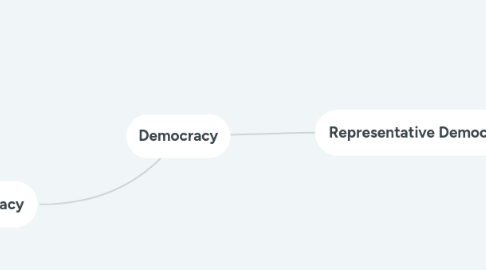
1. Direct Democracy
1.1. Direct Democracy is based on ‘direct’, unmediated and continuous PARTICIPATION of citizens in the tasks of government
1.2. Direct Democracy therefore REMOVES the distinction between the ‘government and the ‘governed’
1.3. Direct Democracy is a system of Popular self-government
1.4. Direct Democracy is a system of Popular self-government
1.5. It was achieved in ancient Athens through a form of government by mass meeting
1.6. The most common MODERN form of direct democracy would be the use of REFERENDUMS
1.7. The benefits/advantages of DIRECT DEMOCRACY
1.7.1. Direct Democracy heightens control = ‘pure form of democracy’ i.e. making decisions for yourself.
1.7.2. It is argued that Direct Democracy creates better-informed and more politically literate citizens i.e. need to be informed to make decisions.
1.7.3. Direct Democracy enables the public to express their own view without having to rely on SELF-SERVING politicians.
1.7.4. Direct Democracy ensures legitimacy – people are more likely to accept decisions that they have made themselves
2. Representative Democracy
2.1. Representative Democracy is an indirect form of democracy.
2.2. Participation is limited in that it is generally infrequent and brief i.e. voting every 4-5 years.
2.3. The public DO NOT exercise power themselves, they select (elect) those who will rule on THEIR BEHALF
2.4. This is DEMOCRATIC as REPRESENTATION establishes a RELIABLE and EFFECTIVE link between the government and the governed.
2.5. This is expressed through the notion of an ‘electoral mandate’
2.6. Benefits/Advantages of REPRESENTATIVE DEMOCRACY
2.6.1. Representative Democracy offers a PRACTICABLE form of democracy (direct popular participation is achievable only in small communities)
2.6.2. Representative Democracy allows government to be in the hands of those with EXPERT knowledge, EXPERIENCE and perhaps better EDUCATED.
2.6.3. Representative Democracy relieves ordinary citizens of the burden of DECISION-MAKING – a division of labour is created in politics
2.6.4. Representative Democracy maintains STABILITY – as it distances ordinary citizens from politics and encourages COMPROMISE
2.6.5. ACCOUNTABILITY is an important feature in Representative Democracy
2.6.5.1. Accountability can be divided into 2 types
2.6.5.1.1. 1 – Those who exercise power do so either as elected representatives or appointed officials. They conduct their activities with the knowledge that they are accountable to a legislature and judiciary and/or the people
2.6.5.1.2. 2 – Powers and Responsibilities are delegated by those in positions of power to people who are charged with carrying out the will of the people in power e.g. Govt minister delegating policy decisions to the civil service
2.6.5.2. The idea of Democratic Accountability is one in which power is invested in the many and not the few
